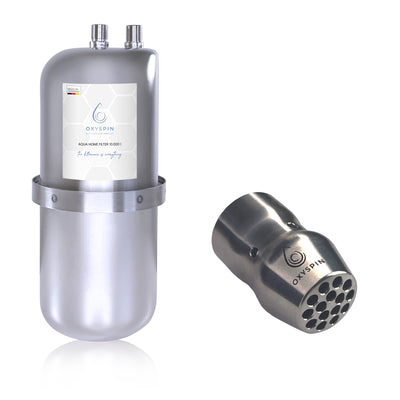Reduce water consumption – protect the environment and save money

If you want to do something good for the environment and your wallet, you can reduce water consumption, among other things. Calculated over a year, the average water consumption for one person is about 46.5 cubic meters. However, everyone can reduce their water consumption and that is exactly what everyone should do! Water is the most important resource and basis for our life on earth. Humans and animals need this vital fluid for their organism to function. Without water, we would most likely be just a small amount of dust made up of minerals. Water is the basis for growing food in agriculture. Climate change makes water even more important and the growing world population is causing water consumption to rise continuously.
Water is taken for granted, especially in Germany, because the region in Europe is considered to be rich in water. Compared to the southern countries, we are better positioned here and that is why we should be more responsible with the vital resource of water and show more appreciation! In 2018 we experienced how the hot summer in Germany brought us out of balance in terms of water technology: the lack of water left its consequences! In some regions, the groundwater level fell well below the average value and the drought caused serious crop failures. At this point it should be noted that it makes sense to reduce water consumption.
Reducing water consumption through increased awareness
On average, a person in Germany uses around 123 liters of water a day in the household, according to the Federal Statistical Office. This is really about a day, not a month or a week. If you don't believe these statistics, you can calculate your water consumption yourself and see for yourself. In 2017, Germany ranked second behind the UK in terms of water consumption in Europe. All other countries used less water. Inland itself, the state of Bavaria makes high figures with its water consumption: A Bavarian citizen uses 131 liters a day! The East Germans in Thuringia use 92 liters of water per person and the Saxons are the most economical in Germany with their 90 liters per person. There is definitely still room for improvement!
Only when you become aware of how and where water consumption takes place in everyday life can you actively do something about it. The consumption of vital drinking water can be neglected at this point. The daily three liters that we take in through food and drink is not decisive for the water consumption of a person in modern society. For example, the key numbers that can help us reduce water consumption start with personal hygiene. Most of the time we don't even notice how much water is flowing down when we're getting ready for everyday life. At this point, Germans use an average of around 20 to 40 liters of water per person. In the toilet, too, we unexpectedly flush 40 liters a day every day. These numbers give us food for thought, but there is more to come. Common household appliances use far more water than we can currently imagine. Because if you add the usual tools in the house, here we are talking about the washing machine and the dishwasher, then our personal water consumption adds up to the said 123 liters per person per day on average. Interestingly, not only is the directly consumed water decisive for water consumption, but there is also indirect water consumption and this can also be high.
Reduce indirect water consumption: Your own household is only part of it
If you broaden your perspective to the global situation, you will find that there is also an actual water footprint and it is skyrocketing at an average of 4,000 liters! Many things that we consume every day are real water guzzlers. Before we buy the finished goods, resource-intensive raw materials such as fruit and vegetables, coffee, avocados and cocoa are often grown in regions with less water. The textile industry, too, often unwittingly contributes to increasing water consumption. At this point, the water consumption per person literally explodes. The cotton used to make our clothes often comes from plantations that add to water scarcity and even water pollution in places far away from us.
If you want to reduce water consumption in the long term, you should not only ensure that the appropriate measures are observed in your household, but consumer behavior is also important. Conscious clothing and food shopping can help reduce water consumption around the world.
Tips on how to reduce water consumption
So that you can still reduce your water consumption today, we have put together a few tips for you. In this way you can reduce your direct water consumption quickly and easily. Good news first: It's not as time-consuming and complicated as you might think at first! The comfort is definitely retained when saving water. In this case, the conscious use of water does not mean that you have to put in more effort, but is worth it for all of us personally, including financially!
Shower more and swim less
A full bath saves about 115 liters of water. That means: With 115 liters you save as much as you would otherwise use on a day without swimming. In addition, the environment is protected here, since you use less hot water. Nature and your water meter are happy!
Reduce water consumption with modern devices
When buying new household appliances, pay attention to efficiency. In the long term, this not only saves money, but also reduces water consumption! Fill your washing machine and dishwasher completely before you let them run and use the available eco and economy programs. Did you know that, amazingly, dishwashers are much more water-friendly and hygienic to use than annoying washing up by hand? For this reason, you can use a dishwasher with a clear conscience!
Go to the toilet smartly
Use the stop button or optimize the float valve in your cistern. Water consumption can be reduced with a simple movement of the hand! Simply open your cistern and turn the float with the thread down. If you have a newer model with you, you can use the built-in aquastop to reduce water consumption.
Well-known, but effective!
Don't let your faucet drip or leave the water running when you're about to wash your hands or brush your teeth.



